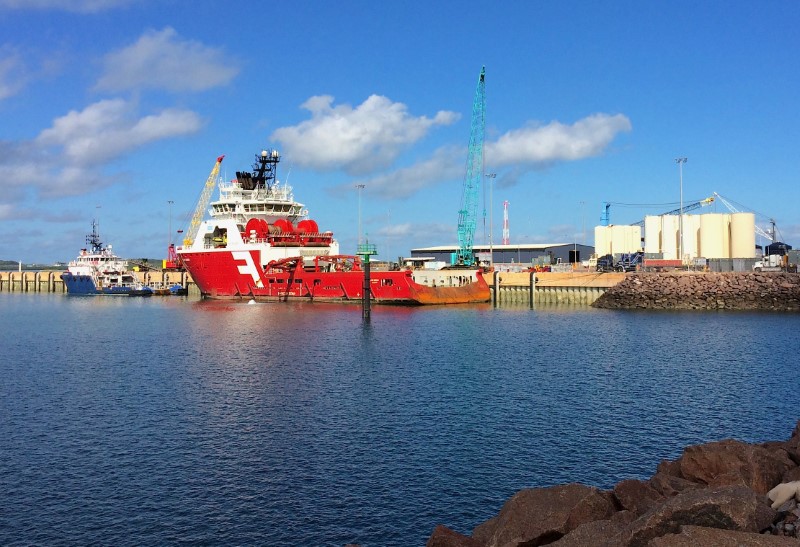By Tom Westbrook
DARWIN (Reuters) - When the United States signed an agreement in 2011 to use Australia's tropical port of Darwin as a base for military exercises, it was viewed as a key focus of former President Barack Obama's strategic pivot to Asia.
But when ammunition and equipment arrives in June for war games between U.S. and Australian forces in tropical Darwin, it will come ashore at the town's Chinese-run port under the eyes of a firm said to have links with China's military.
China, and not the United States, is fast becoming long-neglected Darwin's best hope for rejuvenating a city, named after the 19th-century naturalist Charles Darwin and better known for its monster crocodiles and giant beers.
"I can feel that we are definitely on the cusp of another great leap in our economic growth," said Darwin's Lord Mayor, Katrina Fong Lim, whose ancestors emigrated along with thousands of other Chinese migrants in the 1860s, lured by the discovery of gold. "You just need to have a look around you to look at the investment that's coming in," she said in an interview.
Touted as Australia's front door to Asian markets, and a potential hub for resources and agriculture exports, Darwin is the centrepiece of a A$5 billion (2.90 billion pounds) government loans scheme aimed at developing the continent's north.
China wants to include Darwin, located closer to Indonesia's capital Jakarta than it is to Canberra, in its ambitious One Belt One Road project and the local government has grand plans to attract big-spending Chinese tourists.
MILITARY VS TRADING PARTNERS
"The Chinese are walking the talk," Port of Darwin Chief Executive Terry O'Connor told Reuters, as three camouflage-painted Blackhawk helicopters flew low over the harbour on the April afternoon when a contingent of Marines landed for a regular six-month rotation of forces.
"The Chinese are saying there's an opportunity and they're investing behind it," said O'Connor.
Darwin has hosted a contingent of 1,250 Marines since 2011, part of former President Barack Obama’s strategic pivot to Asia to counter a rising China. It is due to grow to 2,500 by 2020.
Australia’s decision to allow China's Landbridge Group Co to secure a 99-year lease over the strategically important Port of Darwin raised some eyebrows in the United States. The port is the southern flank of U.S. operations in the Pacific.
O'Connor insisted there is "no evidence" of military involvement and the port is "purely a commercial operation".
Landbridge, a petrochemical and port logistics firm, did not respond to requests for comment.
Some critics in Australia, on the other hand, question the tight military relationship with the United States – it has fought alongside America in all its conflicts since World War One – when China has emerged as Australia’s most important trading partner.
BIG PLANS
Landbridge plans to add capacity to the cruise ship terminal and to build a luxury hotel on the waterfront.
Other projects on the drawing board include everything from soybeans and prawn farms, to frozen beef exports and a huge phosphate mine, along with new government-funded roads and rail lines to link them.
But for all the talk, there's as yet little action in Darwin. None of the federal government's promised loans for infrastructure have been disbursed.
"Two years down the track you'll probably see the same," Kim Ly told Reuters, as she served just four diners at her wharf fish and chip shop. "We came here, we worked hard, we saved up, we bought a business. But that was before. Now it is very hard."
The city's population has stalled short of 150,000 - about half a percent of Australian's total - and is seen falling next year.
Low unemployment of 3.5 percent and strong headline growth figures, boosted by multi-billion dollar gas projects from Inpex and Royal Dutch Shell (LON:RDSa), mask a weak underlying economy projected to shrink further.
Visitor numbers are officially forecast to be lower than they were a decade ago, and they will spend 300 fewer hotel nights in the Northern Territory this year than they did in 2007.
Throughput at the wharves is down and the main shopping mall is filled with 'for lease' signs. Short-term apartment rentals, favoured by the resource industry's fly-in-fly-out workers, lie empty.
OUTBACK MINES
The top exports from Darwin are manganese, bound for Malaysia, and live cattle, destined for Indonesia. But piles of iron ore that once waited for export have vanished, the workers who brought it there are gone with it and the outback mines whence it came have shut since commodity prices began to fall in 2014.
Inpex and Shell's major LNG projects, which are tipped to have reserves to last a generation, are beset by delays and cost overruns.
Despite plans to extend the quay line and reclaim more land, investment at the port so far amounts to A$15 million spent on extending asphalted areas, a new pilot boat, and a yard for refrigerated containers.
Major highways in the Northern Territory remain unsealed and often impassable when it rains.
Lonely Planet named Darwin one of the top 10 cities in the world to visit in 2012, citing its vibrant night life, sunset beaches and proximity to several national parks.
Some visitors, however, were unimpressed.

Sharice Sun, a 29-year-old from Xian in China on a working holiday was headed for the library on her day off for lack of anything better to do. Her verdict: "It's too hot, it's small and boring."